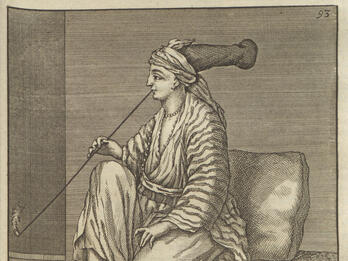Five Polemics Concerning Women
1: Jacob Wants Neither Wife Nor Dowry
Enough, you fools and idiots, enough!
Why do you come to me with sage advice?
Are you still infants? Are you soiling still
Your diapers and sheets with excrement?
Phoo to your counsel, phoo a thousand times!
Never will you catch this Jacob in a trap.
No, no! For no one will induce me ever
To take a wife, even one gold-plated!
Why do I need her cash? To buy a rope
Fetters, chains, an awl to bore my ear?
Dowry is trash as far as I’m concerned,
More like death than ducats.
So don’t go banging on my head with nonsense!
My shoe’s got better sense than all you lot!
2: The Snaring Wife
Woe to men who bind themselves to love,
And chase the women, all oblivious
That they are vessels for the bitter waters,
Even though their eyes be sweet as honey.
Woe to those who pant to be with and enjoy them,
When all you gain by them is pain and sorrow.
They’re quarrelsome, though speaking soft and gently,
Wayward spirits waiting to attack you.
Do not trust them when they are betrothed!
Their favor is just falsehood, lust their love,
Their charms deceit, their whispers flattery.
You ask, “If women can be only evil,
How did you allow one to ensnare you?”
I say, “So I could be her widower!”
3: Words of the Miserable Husband to the Crying Widower
Why do you curse your life, you hapless fool?
Why do you cry until your throat is hoarse?
Why are you contemplating suicide?
Why are you a laughingstock to all?
Why do you pour out rage upon your fate?
Why do you long for your death, and strive for it?
All because a woman sought your door,
O man of little intellect, defective mind!
Traitor Time has caught me in his trap.
Alas, my wife’s a demon in a woman’s
Form, and she, it seems, will live forever!
She will strive with Time itself and win.
For all my grievous sins, she’ll never die
Even if someone clubs her on the skull!”
4: A Letter of Repentance to a Married Friend
When I left Florence
Your silent messenger, my friend, has come
With word that you have got yourself a wife.
Your letter says that this has made you glad.
How I would love to smear your face with dirt!
Your ship of joy is wrecked in sorrow’s sea,
And you without a board of hope to grasp.
You didn’t heed my counsel, foolish you!
So go and die, you dunce, like traitor Teresh.1
How can you now attain religion’s heights?
Alas, you’ll be too tired for any study,
Your mind forever mired in pits of filth!
But let this thought console you: though you broke
The Law of God, you’ll gain eternal life,
Because your life will be a hell on earth!
5: Against Women Who Learn Torah
To teach the Torah to a woman is
To throw a precious gem into the flames,
To set a diamond in a frame of tin,
To build a palace in a wilderness.
It’s dangerous as placing on a roof
A knife that any wind can hurl to earth;
Like setting fire to a heap of wheat,
Or digging a pit where no sun shines;
Like adding many stories to a house
When the foundation walls are rickety.
A woman learned in theology
Is like a black slave married to a lord.
To get the Torah’s vast expanse into her mind
Would be to try to get a ship inside a well.
When she attempts to dress in Torah lore,
She’s naked to the fornication-seeker.
Her thoughts are only on concupiscence;
Her learning’s limited to procreation.
Yes, in a woman’s mouth, the Torah wails
And utters many sighs and lamentations.
You can’t get better than a woman ignorant
Of Torah and of intellectual things,
Who knows enough to teach the children “Hear,
O Israel” but not the words that follow;
Who says her prayers in all simplicity,
In any tongue, without equivocation.
God grants her every wish,
And takes delight in all her supplications.
We’ve studied these opinions; they are true.
Look no farther than Beruriah.
Translated by .
Raymond P.
Scheindlin
Notes
[See Esther 2:21.—Ed.]
Credits
Jacob Frances, “Five Polemics Concerning Women (Hebrew),” in Kol shire Yaʻakov Fransis (1615–1667) (The Poems of Jacob Francès) by Jacob ben David Francese, trans. Pnina Navè Levinson (Penina Naveh) (Jerusalem: Mosad Bialik, 1969), 343–369.
Published in: The Posen Library of Jewish Culture and Civilization, vol. 5.








